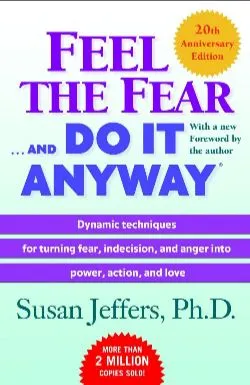
This is a total serviceable self-help book with a really important main idea, but lacking in execution. Even so, I think the target audience of the book will find it valuable–I think they’re largely upper-middle class women, generally well-educated, but feel stuck in life, although it will have something to offer to just about anyone.
This book was recommended to me by my therapist. I feel stuck in life, anxious, but I feel powerless to do anything about it. I’ve been “sheltering in place” because of all of the “what ifs”: what if the economy breaks down and I can’t find work? What if I fail? What if I lose more than I gain by taking drastic action in my life? What if I experience an overwhelming sense of rejection? The root cause of these questions are a sense of fear, and it’s of a single fear: The fear of not being able to “handle it.” Actually, she’s right, and we’re prisons to our own thoughts and feelings.
Jeffers solution is, naturally and obviously: Stop overthinking it, just do it. It goes without saying that she’s right. Things get easier by doing them, not by interminable periods of reflection and analysis paralysis. It’s the only way to move forward. Moreover, this won’t make life any easier: We will get used to our new capabilities and confront new challenges, but we just have to keep pushing through them.
The remainder of chapters are about specific components of this: What if people treat me differently as a result of it? Some of them will, and you have to take stock of who is worth keeping and who is not. How do I maintain momentum? By listening to positivity recordings and exposing yourself to other cheerful content, of course! How do I get my inner chatterbox to shut the fuck up? By relying on your higher, affirmative inner voice!
I found these chapters severely lacking, although there were practicable tid-bits. For example, there’s this discussion about changing your mindset to believe that you matter, and you’ll act as if you do. If you don’t believe that you–or what you do–matters, then things will naturally fall apart as you shrink back from life’s many challenging circumstances. She’s right on this, and it resonated heavily with me: I don’t feel that I–or what I do–matter(s).
I tried to implement some of Jeffers’s suggestions into my life this week, and it’s funny how it played out. I said that I’d do everything I set out to do, and I did! I did them! But the reason I worried because I was afraid of unpredictable circumstances that could come about as a result, and it turned out that they were worse than I anticipated. As a result, I fell back into my habitual pessimism. It was a sign that I need to do something wholly differently.
And that is one thing that the book–and really any book focused wholly on “self help”–misses: we do not inhabit a world of individuals. We are socially embedded, and things outside of our control do impact us, and the attempt to control everything brings about profound suffering. This is why religious practice can be so therapeutic: they allow us to accept that which we cannot control. Islam urges us to submit to God’s will and not fight against it, Christianity asks us to do the same, Buddhism urges non-attachment, and so on. We must accept things as they are. What we can do is say, “Ok, there’s nothing I can do to change this, so it’s time to find something else.” Feeling the fear and doing it anyways won’t always work, but we can select what we will be brave about rather than hiding in a corner and letting life pass us by.
I’d also probably rename the book to something like Do It Anyways! Jeffers pushes us to act, but she doesn’t actually help with feeling the fear. Instead, most of the advice in here seems more preoccupied with drowning it out. We shouldn’t let the fear in at all! What we should do, in my reading of Jeffers, is fill ourselves with light and hope and a positive mindset. It’s not bad advice, but there is the risk of suppression and it affecting our health. My own general tendency is–when I feel something negative–to ruminate on it, to reflect on it, and to fill myself with it. That’s also not the right option.
This won’t be a book for everybody, although I think everyone can learn something from it. It falls into the same trap as so many other self help books, which is a shame, but I’m not sure that there’s much Jeffers could have done differently without writing an entirely different book.